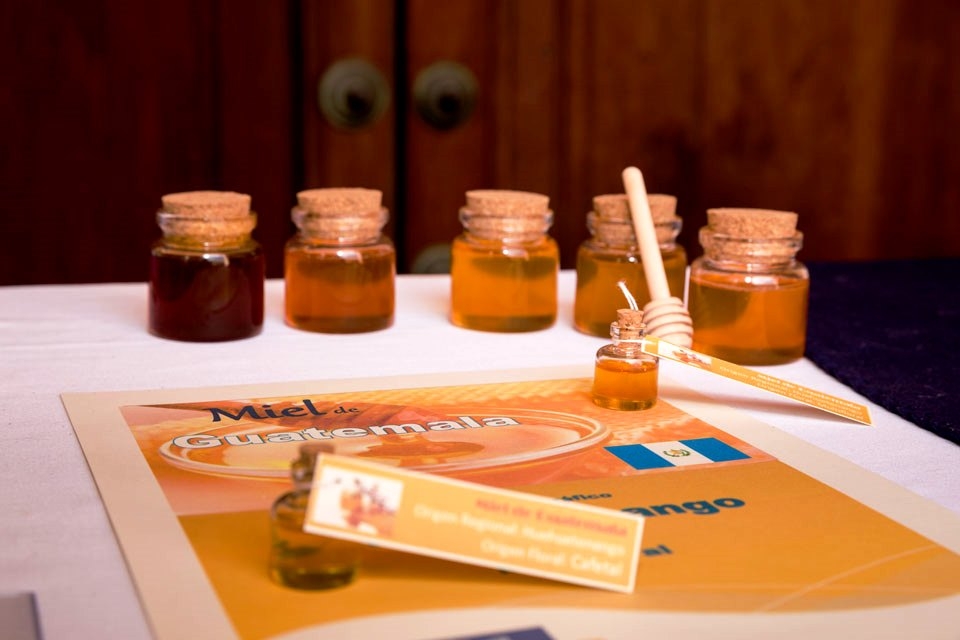
The project sought to extend international market access for Guatemalan honey and improve living conditions for beekeepers and other actors in the country's honey value chain. In particular, the project’s activities contributed to the implementation of an electronic records system designed to ensure product traceability through all stages of production, processing and distribution, and helped increase the application of good production and manufacturing practices.
In Guatemala, beekeeping is generally practiced as a secondary activity by small-scale farmers, and is a source of temporary employment, particularly during the harvesting season. The sector's main activities are honey exports, with virtually no marketing of any other hive by-products such as pollen, propolis, royal jelly or wax. There are an estimated 3,000 beekeepers and 150,000 beehives nationwide. However, the Guatemalan Beekeeping Register (REGAPI) of the Ministry of Agriculture, Livestock and Food (MAGA) has only 1,421 beekeepers and 95,376 beehives registered.
There are another 31 establishments responsible for the collection, processing, packaging and export of natural honey, seven of which are cooperatives or associations of small-scale honey producers. These are registered in the MAGA food safety directorate's safety system (SII).
In terms of safety, efforts have been made to improve technology for production and packaging. But practices that can result in contamination, such as the use of harmful chemical residues, continue. Different formats are also used to record the various production, processing and distribution procedures without any standardization, making it impossible to ensure appropriate product traceability.
Guatemala now exports natural honey to the EU, US and Central America. This has encouraged many producers to improve their production processes, including by applying HACCP-equivalent systems. By establishing practices such as traceability records, it will be possible to retain these markets and increase export volumes.
There have been many cases of honey contamination in Guatemala, but it has been difficult to establish exact places of origin due to the lack of specific traceability records. Contaminated products have been destroyed to protect consumer health, in accordance with the protocols of destination markets, but it has not been possible to identify the specific beehives or beekeepers concerned so that any substandard honey-production practices may be rectified, or whether withdrawal periods are respected after a specific product has been applied.
Guatemala has introduced legislation (Ministerial Decision no. 169-2012) to ensure that all beekeepers are registered for the purposes of traceability and the application of various types of sanitary measures. The implementation of an electronic records system is important for ensuring compliance with this legislation.
Electronic traceability system
A honey production traceability module has been designed and integrated into the national agriculture traceability platform (Guatemala's electronic records system). The module includes all records necessary to trace honey and track its movement through production, harvesting, receipt at plant and packaging for export or marketing in the domestic market. It also covers aspects related to official safety monitoring, such as sample taking, the results of analyses and certification.
Important to note is that the honey production traceability module has also been integrated into the regional system for agricultural, aquaculture and fishery traceability that OIRSA makes available to countries in the region. The aim of this is to extend the impact of the electronic system in the beekeeping sector and contribute to harmonization. The same recording processes are already being adopted and implemented in other countries of the region, including El Salvador and Dominican Republic.
Strengthening of beekeepers' capacities for good practice
A training programme on good practices in honey production was carried to build capacity among beekeepers. Additional areas covered related to good beekeeping practices, which included the introduction and validation of the electronic traceability system in each locality.
Various training materials were also developed, including: the beekeeper's handbook, which was designed to support the data capture and recording process; the handbook of good practices in honey production, which was distributed for immediate consultation among the targeted groups; and the beekeeper's calendar, which included technical details relevant to honey production.
Follow-up and continuous improvement plan
To ensure ongoing monitoring, the food safety directorate has followed up on recording processes and the adoption of the records system with beekeepers, collection centers, and honey processing and packaging plants. It has received technical assistance in this process from OIRSA, which has integrated the electronic system into its regional traceability platform and placed the system's development team at the disposal of other actors across the country and the region.
To this end, the operational plan of the regional traceability unit includes provision for ongoing technical support for the platform's day-to-day use. The platform is to be offered to MAGA and users remotely, as well as for face-to-face participation in events and activities, including activities involving beekeepers, cooperatives and plants; direct cooperation with MAGA; and training, assistance and follow-ups.
Extended use of the system in the region
The system can be replicated as it was built on the basis of the regional apicultural traceability standard agreed on and harmonized by all countries in the region. Replication and adoption processes have already begun in two OIRSA countries, El Salvador and Dominican Republic. These two countries have completed installing the regional platform and the honey production traceability module and are beginning the beekeeper registration process. Nicaragua is in the process of implementing the platform. Once this process is complete, the specific honey production traceability module can be made available in the country.